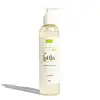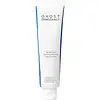What's inside
What's inside
 Key Ingredients
Key Ingredients

 Benefits
Benefits

 Concerns
Concerns

 Ingredients Side-by-side
Ingredients Side-by-side

Water
Skin ConditioningDecyl Glucoside
CleansingCocamidopropyl Betaine
CleansingSodium Methyl Cocoyl Taurate
CleansingGlycerin
HumectantNiacinamide
SmoothingXanthan Gum
EmulsifyingUrea
BufferingSchizophyllan
HumectantAllantoin
Skin ConditioningSalix Alba Bark Extract
AstringentCoco-Glucoside
CleansingGlyceryl Oleate
EmollientLauryl Glucoside
CleansingCucumis Sativus Fruit Extract
EmollientPhenoxyethanol
PreservativeEthylhexylglycerin
Skin ConditioningWater
Skin ConditioningDecyl Glucoside
CleansingSodium Methyl Cocoyl Taurate
CleansingGlycolic Acid
BufferingCoco-Glucoside
CleansingGlyceryl Oleate
EmollientGlycerin
HumectantMandelic Acid
AntimicrobialXanthan Gum
EmulsifyingSalix Alba Bark Extract
AstringentSodium Hydroxide
BufferingSchizophyllan
HumectantNiacinamide
SmoothingLavandula Angustifolia Flower/Leaf/Stem Extract
MaskingCamellia Sinensis Leaf Extract
AntimicrobialCitrus Limon Peel Extract
EmollientPyrus Malus Fruit Extract
Skin ConditioningRubus Idaeus Fruit Extract
AstringentSalvia Officinalis Leaf Extract
CleansingRosmarinus Officinalis Leaf Extract
AntimicrobialCucumis Melo Fruit Extract
Skin ConditioningVaccinium Macrocarpon Fruit Extract
AstringentLauryl Glucoside
CleansingCitric Acid
BufferingTriethyl Citrate
MaskingEthylhexylglycerin
Skin ConditioningPhenoxyethanol
PreservativeWater, Decyl Glucoside, Sodium Methyl Cocoyl Taurate, Glycolic Acid, Coco-Glucoside, Glyceryl Oleate, Glycerin, Mandelic Acid, Xanthan Gum, Salix Alba Bark Extract, Sodium Hydroxide, Schizophyllan, Niacinamide, Lavandula Angustifolia Flower/Leaf/Stem Extract, Camellia Sinensis Leaf Extract, Citrus Limon Peel Extract, Pyrus Malus Fruit Extract, Rubus Idaeus Fruit Extract, Salvia Officinalis Leaf Extract, Rosmarinus Officinalis Leaf Extract, Cucumis Melo Fruit Extract, Vaccinium Macrocarpon Fruit Extract, Lauryl Glucoside, Citric Acid, Triethyl Citrate, Ethylhexylglycerin, Phenoxyethanol
Ingredients Explained
These ingredients are found in both products.
Ingredients higher up in an ingredient list are typically present in a larger amount.
Coco-Glucoside is a surfactant, or a cleansing ingredient. It is made from glucose and coconut oil.
Surfactants help gather dirt, oil, and other pollutants from your skin to be rinsed away.
This ingredient is considered gentle and non-comedogenic. However, it may still be irritating for some.
Learn more about Coco-GlucosideDecyl Glucoside is a glucose-based surfactant and emulsion stabilizer. It is created by reacting glucose with the fatty acids from plants.
Surfactants help clean the skin by trapping oil, sebum, and dirt to be washed away. As an emulsion stabilizer, it stabilizes the ingredients in a product by preventing them from separating.
This ingredient is biodegradable and non-toxic. This ingredient is commonly found in baby shampoos.
Decyl Glucoside is sometimes used to stabilize the UV filter Tinosorb.
Learn more about Decyl GlucosideEthylhexylglycerin (we can't pronounce this either) is commonly used as a preservative and skin softener. It is derived from glyceryl.
You might see Ethylhexylglycerin often paired with other preservatives such as phenoxyethanol. Ethylhexylglycerin has been found to increase the effectiveness of these other preservatives.
Glycerin is already naturally found in your skin. It helps moisturize and protect your skin.
A study from 2016 found glycerin to be more effective as a humectant than AHAs and hyaluronic acid.
As a humectant, it helps the skin stay hydrated by pulling moisture to your skin. The low molecular weight of glycerin allows it to pull moisture into the deeper layers of your skin.
Hydrated skin improves your skin barrier; Your skin barrier helps protect against irritants and bacteria.
Glycerin has also been found to have antimicrobial and antiviral properties. Due to these properties, glycerin is often used in wound and burn treatments.
In cosmetics, glycerin is usually derived from plants such as soybean or palm. However, it can also be sourced from animals, such as tallow or animal fat.
This ingredient is organic, colorless, odorless, and non-toxic.
Glycerin is the name for this ingredient in American English. British English uses Glycerol/Glycerine.
Learn more about GlycerinGlyceryl Oleate is the ester of glycerin and oleic acid. This ingredient is mainly an emollient and emulsifier.
Emollients soften and hydrate the skin by creating a thin film on top to trap in moisture. As an emulsifier, glyceryl oleate helps stabilize formulations by preventing ingredients such as oil and water from separating. According to a manufacturer, this ingredient helps helps thicken water-in-oil formulations, shower gels, and hair shampoos.
In some products, this ingredient may be used as a fragrance / perfuming ingredient. The scent of this ingredient is described to be "waxy".
Glyceryl oleate is created from oils rich in oleic acid, such as peanut oil and olive oil.
This ingredient may not be malassezia folliculitis safe.
Learn more about Glyceryl OleateLauryl Glucoside sugar- and lipid-based cleansing agent. It is created from glucose and lauryl alcohol.
This ingredient is a surfactant, making it easier to rinse oil, dirt, and other pollutants away.
A British study found lauryl glucoside to cause skin sensitivity for some people. We recommend speaking with a professional if you have concerns.
Other names for this ingredient include "Lauryl Polyglucose", "Lauryl glycoside", and "D-Glucopyranoside".
Learn more about Lauryl GlucosideNiacinamide is a multitasking form of vitamin B3 that strengthens the skin barrier, reduces pores and dark spots, regulates oil, and improves signs of aging.
And the best part? It's gentle and well-tolerated by most skin types, including sensitive and reactive skin.
You might have heard of "niacin flush", or the reddening of skin that causes itchiness. Niacinamide has not been found to cause this.
In very rare cases, some individuals may not be able to tolerate niacinamide at all or experience an allergic reaction to it.
If you are experiencing flaking, irritation, and dryness with this ingredient, be sure to double check all your products as this ingredient can be found in all categories of skincare.
When incorporating niacinamide into your routine, look out for concentration amounts. Typically, 5% niacinamide provides benefits such as fading dark spots. However, if you have sensitive skin, it is better to begin with a smaller concentration.
When you apply niacinamide to your skin, your body converts it into nicotinamide adenine dinucleotide (NAD). NAD is an essential coenzyme that is already found in your cells as "fuel" and powers countless biological processes.
In your skin, NAD helps repair cell damage, produce new healthy cells, support collagen production, strengthen the skin barrier, and fight environmental stressors (like UV and pollution).
Our natural NAD levels start to decline with age, leading to slower skin repair, visible aging, and a weaker skin barrier. By providing your skin niacinamide, you're recharging your skin's NAD levels. This leads to stronger, healthier, and younger looking skin.
Another name for vitamin B3 is nicotinamide. This vitamin is water-soluble and our bodies don't store it. We obtain Vitamin B3 from either food or skincare. Meat, fish, wheat, yeast, and leafy greens contain vitamin B3.
The type of niacinamide used in skincare is synthetically created.
Learn more about NiacinamidePhenoxyethanol is a preservative that has germicide, antimicrobial, and aromatic properties. Studies show that phenoxyethanol can prevent microbial growth. By itself, it has a scent that is similar to that of a rose.
It's often used in formulations along with Caprylyl Glycol to preserve the shelf life of products.
Salix Alba Bark Extract comes from the white willow tree, which is native to Europe and Central Asia.
Salix Alba Bark Extract has often been described as salicylic acid's cousin. This is due to the salicin it contains. However, studies are limited showing salix alba bark to be an effective salicylic acid alternative.
Salicin does have anti-inflammatory and antioxidant properties. It has shown to decrease the formation of inflammatory mediators, such as tumor necrosis factor-α and nuclear factor-kappa B. Salicin also has a mildly exfoliating effect on the skin.
Several other components in salix alba bark extract also contain antioxidant properties, such as flavonoids and polyphenols. Antioxidants may help with anti-aging as they neutralize harmful free-radical molecules.
Willow Bark extract has been used for thousands of years. Ancient civilizations used white willow to help treat pain and fevers.
Learn more about Salix Alba Bark ExtractWe don't have a description for Schizophyllan yet.
This gentle cleansing and foaming ingredient is known for leaving a smooth feeling in skin and hair. It is made using coconut oil.
According to the manufacturer, it is soluble in water and has resistance to hard water, acid, and alkali.
Due to its coconut base, it may not be Malassezia folliculitis safe.
Learn more about Sodium Methyl Cocoyl TaurateWater. It's the most common cosmetic ingredient of all. You'll usually see it at the top of ingredient lists, meaning that it makes up the largest part of the product.
So why is it so popular? Water most often acts as a solvent - this means that it helps dissolve other ingredients into the formulation.
You'll also recognize water as that liquid we all need to stay alive. If you see this, drink a glass of water. Stay hydrated!
Learn more about WaterXanthan gum is used as a stabilizer and thickener within cosmetic products. It helps give products a sticky, thick feeling - preventing them from being too runny.
On the technical side of things, xanthan gum is a polysaccharide - a combination consisting of multiple sugar molecules bonded together.
Xanthan gum is a pretty common and great ingredient. It is a natural, non-toxic, non-irritating ingredient that is also commonly used in food products.
Learn more about Xanthan Gum